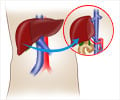Blockage of sphingolipid de novo synthesis pathway impairs hepatocyte polarity, attenuates liver regeneration after hepatectomy.

‘Blockage of sphingolipid de novo synthesis pathway impairs hepatocyte polarity, attenuates liver regeneration after hepatectomy.’





Because all cell
membranes that define cell boundaries and polarity contain lipid
bi-layer structures, the lipid, including sphingolipid, environment
could influence polarity, yet the mechanism underlying this remission is
unknown.Importantly, the deficiency significantly reduces sphingomyelin but not other sphingolipids in hepatocyte plasma membrane, and greatly reduces cadherin, the major protein in adherens junctions, on the membrane. The deficiency affects cellular distribution of b-catenin, the central component of the canonical Wnt pathway.
Furthermore, such a defect can be partially corrected by sphingomyelin supplementation in vivo and in vitro. SUNY Downstate's Professor of Cell Biology Xian-Cheng Jiang and Assistant Professor of Surgery Chongmin Huan are co-corresponding authors of the article detailing the research.
Dr. Jiang explained, "This was a seven-year effort and a breakthrough linking sphingolipid-mediated cell junctions and tumorigenesis. Our results, for the first time, show that plasma membrane sphingomyelin-related b-catenin cellular distribution is one the key factors in regulating hepatocyte polarity and tumorigenesis."
Dr. Jiang concludes, "This study also will provide a guide for the development of serine palmitoyltransferase inhibitors, which have a potential for the treatment of metabolic diseases such as diabetes."
Advertisement










